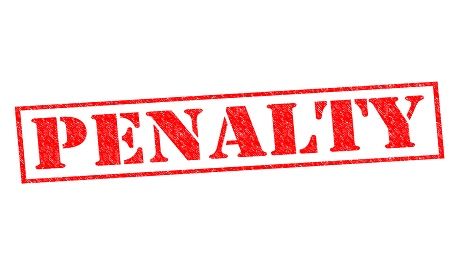As Tax Season looms closer, it’s worth having a quick discussion with the partner group on your firm’s policy for paying client’s tax penalties. Why should you have this discussion immediately? Failure to properly report and receive clearance from your insurer can void your policy on that issue! Tax penalties tend to make unhappy clients and unhappy clients tend to bring claims. Claims also make unhappy partners, but having a claim with no insurance coverage will be exceedingly painful. Tax claims are the most frequent type of claim, so it’s worth being savvy in this area.
Why Firms Do This:
“Time is Money…” – Benjamin Franklin
Annoying clients is never a good business practice. Neither is wasting your own time. If your largest client happens have a $100 tax penalty are you really going to waste your own billable time and social equity with that client? How will they feel now that they must take their own time, and the time of their employees to deal with such a minor issue? On both fronts, many firms simply pay the penalty, or waive their fees, and move on. However, you have some underlying policy implications to consider first.
Paying Tax Penalties:
“I’m a big crier in general. The right life insurance commercial will take me out for a couple of days.” -Isaac “Ike” Barinholtz
VII. POLICY CONDITIONS – C. Cooperation and Assistance of the Insured:
3. The Insureds shall not, except at the Named Insured’s own cost and expense,
admit any liability, assume any Damages, voluntarily make any payments, or
incur any Claim Expenses without the prior written consent of the Company.
Referencing the language above, we can see that paying tax penalties is problematic on two fronts. First, you can’t make voluntary payments. Second, these voluntary payments could insinuate your admission of liability for that penalty. The above was taken directly from a CAMICO policy, but regardless of who your insurer is, you likely have very similar policy language.
The larger the client, the larger penalty a firm would consider paying to keep them happy. It is also more likely that there is a significant underlying issue that brought about that penalty. This of course means there is a much higher probability for a claim to occur. Do not be caught without coverage.
What if I Waive My Fees Instead?
This could easily be construed as falling under the same exclusions as those raised when you pay penalties for your client. By waiving your fees, you are likely admitting some level of liability on the matter, and settling without insurer consent. The same considerations we raised for tax penalties should apply to waiving fees.
Speak with your Insurance Company First:
We recommend that you first consider speaking with your insurer concerning the payment of a client’s tax penalties, or waiving of fees. The rationale behind this recommendation falls into three main categories:
- Reporting the issue to your insurer keeps you consistent with your policy requirement of reporting potential claims. Should the matter later devolve into a claim, you can save significant money on your deductible should the matter later become a claim. Some insurers offer up to 50% off your deductible (up to $50,000) for early reporting.
- Speaking with your insurer’s loss prevention experts and CPA/JDs can help guide your firm on how to proceed with the penalty, what to tell your client, and recommendations on how to prevent the issue in the future. With a quality insurer, all pre-claim expenses are paid by your insurer and not subject to your deductible.
- After speaking with your insurer, the most likely outcome is that you’ll receive permission to use their penalty waiver form. This should:
- Avoid the exclusion barring coverage we discussed earlier.
- Keep your client happy.
- Provide your firm another opportunity to create good-will with your client.
- Release you from most follow-on claims against your firm related to the penalty.
Will This Annoy My Clients?
“Those people who think they know everything are a great annoyance to those of us who do.” -Isaac Asimov
At first, many firms are hesitant to use their insurer provided release form because they believe that it may scare clients away or damage their accountant-client relationship. However, this practice has been in place for many years. They’re usually quite happy to avoid additional payments, and it imparts additional good will on behalf of your firm. Think of it as another opportunity to interact with clients and demonstrate your ability to solve their problems.
When Should I Report?
“There are no secrets that time does not reveal.” -Jean Racine
While we always want to keep you compliant with your policy, there is a risk/reward calculus present in all activities. In this instance, most of the firms we work with have developed a penalty threshold before reporting the issue to their insurer. After all, going through the motions for every $100 tax penalty is likely not worth the time, and the risk is relatively small. Ultimately, each firm is unique, but given the ramifications of having a declination of coverage, it’s worth discussing at your next partner meeting what your internal policy will be.
Some firms erroneously believe that they should never report an issue to their insurer that falls below their deductible payment. Remember that claims expenses and damages awarded can easily be multiples of the tax penalty that initially arose. If you are ever in doubt, report the matter.
How Do I Report?
“We do all of our own stunts” – Dan & Joe
Within your professional liability policy, there should be a line that specifies how you are supposed to report any claims or potential claims. Proactive brokers that specialize in this area should be able to field the issue for you, and best position your case to the insurer.
Partner Action Items
Send this article to relevant partners so you can have a basis for discussion. They need to understand the policy implications of paying penalties without insurer consent. They’ll be involved with the following action items as well.
Determine what threshold of penalty your firm will pay before you want it reported to your insurer. If your firm is going to pay tax penalties, or waive fees, on behalf of clients, discuss what special circumstances, regardless of penalty amount, would warrant reporting. Remember, this policy needs to remain internal. Don’t promise your clients, contractually, or otherwise, that your firm will pay for all tax penalties.
Consider who will be the central point of contact that will authorize payment of tax penalties. This is typically the CFO/Controller, advised by the leading tax partner. We often see the CFO/Controller speak with the Managing Partner before issuing large payments as a secondary check on compliance.
Train your staff. This cannot be emphasized enough. Your staff should never promise a client your firm will pay a tax penalty without first being advised by management. They should also have a clear understanding of how, and to whom, they should report tax penalties and other client related problems.
Speak with your professional liability insurance broker. Will you receive an early reporting credit? Are pre-claim expenses paid by your insurer and not charged against your deductible? Do your insurer/broker have the expertise necessary to assist you in this area? These are all issues that should be talking points with your broker. If you are ever in doubt concerning policy language, consult legal counsel familiar in this area.
Help a friend. If you or your partners were previously unaware of the information in this article, it’s assured that your friends in other firms are likewise unaware. Given that most accountant’s professional liability policies contain roughly the same exclusion we discussed, consider sending them this article.
Please direct further questions to:
Chesapeake Professional Liability Brokers, Inc.
Daniel W. Hudson dhudson@cplbrokers.com
Joseph E. Brunsman joseph@cplbrokers.com
Thanks for reading CPA Practice Advisor!
Subscribe Already registered? Log In
Need more information? Read the FAQs




